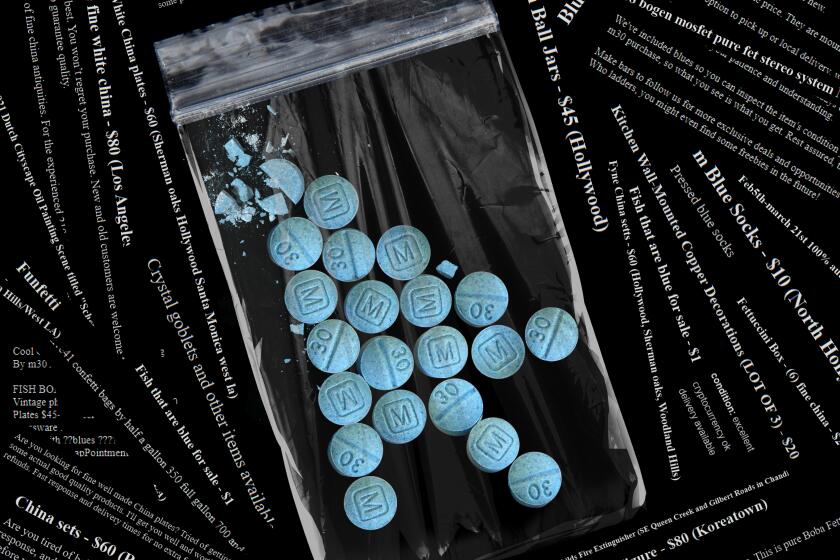Woman said to run Hollywood drug delivery service faces trial — but not for fatal overdose

- Share via
- Mirela Todorova, 36, is accused of running a drug delivery business out of her Hollywood apartment.
- Her trial is underway in Los Angeles, but prosecutors reduced a charge linked to the fatal fentanyl overdose of a Beverly Hills man.
Three years ago, a federal grand jury indicted Mirela Todorova on charges of running a drug delivery business out of her Hollywood apartment that supplied one customer with a deadly dose of fentanyl.
Authorities said the overdose of Beverly Hills resident Ray Mascolo, 37, is what led them to uncover the operation allegedly run by Todorova.
But with her trial beginning this week, Todorova, 36, is no longer directly charged with causing Mascolo’s death — although she could still face life in prison for three nonfatal overdoses caused by drugs allegedly supplied by her.
“Each of these victims thought they were getting clean oxy pills. Instead, they got fentanyl,” prosecutor Suria Bahadue said during opening arguments Wednesday morning. “The same deadly drug, from the same deadly person.”
Defense attorney Charles Brown told the jury that Todorova is not the “drug lord” the government has portrayed her to be. He pointed to Todorova’s ex-boyfriend as the true ringleader of the Hollywood drug operation.
“‘Forrest Gump’ is being accused of being ‘Scarface,’” Brown said.
A former drug delivery driver testified Wednesday that he worked for the boyfriend “from time to time” but also did the same work “under Mimi’s order,” using a nickname for Todorova.
The prosecution has said that a sprawling digital trail — composed of text exchanges, online payments and photos leads to Todorova.
“The evidence will show that money was the motive,” Bahadue said, adding that Todorova ultimately “put profit over people’s lives.”
The case began when Mascolo was found dead in his Beverly Hills home in November 2020, allegedly after purchasing fentanyl-laced oxycodone pills from one of Todorova’s delivery drivers, Kather Sei.
Whereas other sites and apps almost eliminated drug postings after scrutiny by law enforcement, dealers on Craigslist seemingly remained active using code words.
In February 2022, a federal grand jury indicted Todorova and Sei for the death. Sei is awaiting sentencing after pleading guilty to possession of drugs with intent to distribute.
Todorova rejected a “favorable plea offer” because she maintains her innocence, Brown told The Times.
In a Jan. 31 motion to narrow their indictment against Todorova, prosecutors asked that she be charged solely for distributing fentanyl to Mascolo, striking “surplusage and factual allegations” pertaining to his death.
She faces the three nonfatal fentanyl distribution counts, plus additional charges alleging she sold methamphetamine, cocaine and ecstasy, engaging in conspiracy and making false statements to authorities. .
Prosecutors argued that the revision to the indictment was in the court’s and Todorova’s best interests for “presenting an efficient trial.”
David Pearce, who allegedly dumped two women at L.A. hospitals after they overdosed in his apartment in 2021, was convicted of two counts of murder and seven counts of sexual assault involving claims from women that dated back nearly two decades.
In a pretrial hearing, Brown called the motion a calculated attempt by the government to “sanitize” its case.
He pointed to a fuzzy timeline of events provided by the government on the night Mascolo died, and said that “by taking [Mascolo] out of it, they erase all the question marks in their investigation.”
The U.S. attorney’s office declined to comment on the narrowed indictment.
Brown has also argued that Todorova has autism, which “made her uniquely vulnerable to manipulation and abuse by unscrupulous others,” including her ex-boyfriend.
Drug overdose deaths fell sharply in San Francisco in 2024. Experts credit better access to overdose-reversal medication and medications that ease opioid addiction, as well as the waning effects of the COVID pandemic.
“Tragically, a perfect storm of circumstances has brought her before a criminal justice system that is ill-equipped to explore the moral and philosophical questions that this case presents,” Brown said in an emailed statement before the trial.
Judge André Birotte Jr. denied a motion by Brown to make a diminished-capacity defense, saying during a pretrial hearing that although he is “sympathetic and empathetic” to Todorova’s condition, he views attributing her actions to autism as a “slippery slope.”
Asking for sympathy may be appropriate during sentencing, he added, but not during trial.
Mascolo’s mother, Kyara Mascolo, said that although her son’s death is no longer key to the case, she still plans to attend the trial.
“I feel like it’s a way of showing respect to my son,” she said in an emailed statement. “My hope is that justice will be served and the people who poisoned him will be prosecuted accordingly.”
More to Read
Sign up for Essential California
The most important California stories and recommendations in your inbox every morning.
You may occasionally receive promotional content from the Los Angeles Times.













